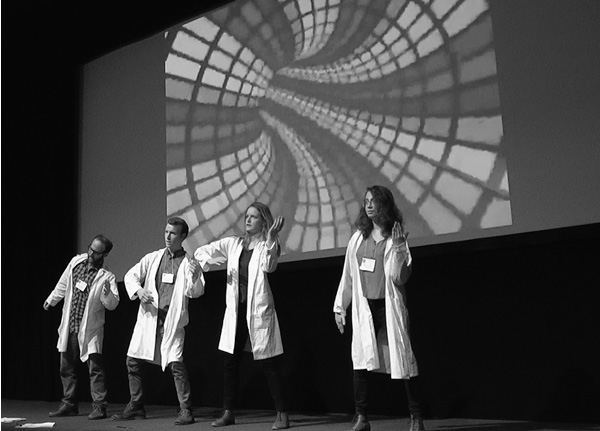
SENSING REPETITION
first performed on April 11, 2015
What Can Performance Philosophy Do? The 2nd Biennial Performance Philosophy Conference, The School of the Art Institute of Chicago, Chicago, IL
performed once in 2015
THE SCHOOL OF MAKING THINKING / MICHELLE BENTSMAN, AARON FINBLOOM, BENJAMIN KORTA, SOPHIE TRAUB
Cambridge, MA / Montreal, QC / Berlin, Germany / Brooklyn, NY
373829846t373829846h373829846e373829846s373829846c373829846h373829846o373829846o373829846l373829846o373829846f373829846m373829846a373829846k373829846i373829846n373829846g373829846t373829846h373829846i373829846n373829846k373829846i373829846n373829846g373829846@373829846g373829846m373829846a373829846i373829846l373829846.373829846c373829846o373829846m
theschoolofmakingthinking.com
SENSING REPETITION
THE SCHOOL OF MAKING THINKING / MICHELLE BENTSMAN, AARON FINBLOOM, BENJAMIN KORTA, SOPHIE TRAUB
“Sensing Repetition” explored the role of repetition in the process of meaning-making. As silver-eyebrowed, labcoat wearing “philosopho-bots”—robots with a strong wish to comprehend the nature of human thought and emotion—we lead participants through a series of playful experiments designed to tackle our core conundrum: why does repetition generate meaning in some circumstances, and obstruct meaning in others?
To approach this problem, we embarked on a research mission with the audience as our subjects. Participants were “vetted” at the door, asked to sign a waiver written in our native language of binary code, given guiding booklets with supplementary philosophical information, and invited to take part in a series of experiments as both observers and experimental subjects upon whom we tested our hypotheses. We conducted five experimental situations, each taking place within the overarching framework of a philosophical laboratory. Each experiment corresponded to a region on our “Bell Curve of Meaning and Non-Meaning,” which mapped the accumulation and degradation of meaning resulting from repetition over time.
During our “Verbal Satiation Experiment,” participants lied down with their eyes closed as they listened to audio of a recorded phrase on loop. Our “Philosopho-Generative Experiment” asked participants to read and re-read a Hans-Georg Gadamer passage on the subject of repetition, and then enact a circumscribed dialogue wherein one person used scripted questions to ask their interlocutor to repeat and clarify their thoughts.
Our “Meisner Experiment” employed the classical acting technique of Sanford Meisner, using dialogical repetition as a means to observe authentic impulse. This was followed by a reading and discussion of Gilles Deleuze on the “theater of repetition.” In our “Memoryscope Experiment,” participants transformed a simple circle upon a sheet of paper into their very own “memoryscope.” Through a series of instructions, this tool was used as an interface to access memories of the deep or recent past and future.
During our “Mantra Experiment,” participants were placed in pairs to engage in stream-of-consciousness monologues. Everyone chose a phrase from their partner’s monologue, which became a mantra that their partner repeated aloud for a duration. Our piece bridged the methods of philosophy and performance by creating situations in which concepts could be represented and embodied in equal measure. Experiential inquiry into repetition became a mode of foregrounding the emergence—or non-emergence—of meaning, thereby offering a view into the living practice of philosophy.